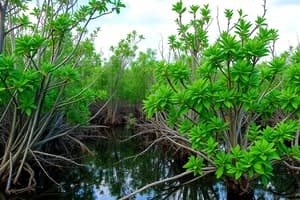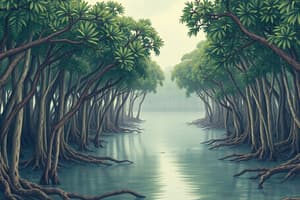Podcast
Questions and Answers
What type of environments do mangroves forests tolerate?
What type of environments do mangroves forests tolerate?
salt water or salty soils
What is the function of the prop roots in Red Mangroves?
What is the function of the prop roots in Red Mangroves?
to stabilize them at sea
What is the purpose of the pneumatophores in Black Mangroves?
What is the purpose of the pneumatophores in Black Mangroves?
to obtain oxygen
What is the function of the nectary glands in White Mangroves?
What is the function of the nectary glands in White Mangroves?
What is the characteristic of the leaves of Buttonwood (Grey Mangrove)?
What is the characteristic of the leaves of Buttonwood (Grey Mangrove)?
What is the unique feature of the propagules, or young seedlings, of Red Mangroves?
What is the unique feature of the propagules, or young seedlings, of Red Mangroves?
What is the primary function of the bark of Red Mangroves?
What is the primary function of the bark of Red Mangroves?
Which type of mangrove has adapted to grow in anoxic environments?
Which type of mangrove has adapted to grow in anoxic environments?
What is the primary function of the nectary glands in White Mangroves?
What is the primary function of the nectary glands in White Mangroves?
Which type of mangrove has a root system that prevents drying out?
Which type of mangrove has a root system that prevents drying out?
What is unique about the propagules of Red Mangroves?
What is unique about the propagules of Red Mangroves?
Which type of mangrove has two color forms in the Bahamas?
Which type of mangrove has two color forms in the Bahamas?
Flashcards are hidden until you start studying
Study Notes
Mangroves Forest
- Mangroves are plants that grow on the leeward side of a coastal community, tolerating saltwater or salty soils.
Zonation of Mangroves
- The zonation of mangroves from sea to shore includes:
- Red Mangroves
- Black Mangroves
- White Mangroves
- Buttonwood
Red Mangroves
- Have prop roots that stabilize them at sea
- Propagules (young seedlings) drop and float until they stick in the mud and grow into a new tree
- Bark contains tannic acid, which turns reddish brown when it oxidizes
Black Mangroves
- Found in muddy areas with little or no oxygen (anoxic)
- Have adapted by developing vertical roots (pneumatophores) to obtain oxygen
White Mangroves
- Found on the shore
- Have fleshy leaves to help retain water
- Have nectary glands that secrete sugar to attract wasps and bees to defend against predators
Buttonwood (Grey Mangrove)
- Has a reg root system
- Has smooth, thick, waxy leaves that prevent drying out
- In the Bahamas, there are two color forms: Green Buttonwood and Silver Buttonwood
Mangroves Forest
- Mangroves are plants that grow on the leeward side of a coastal community, tolerating saltwater or salty soils.
Zonation of Mangroves
- The zonation of mangroves from sea to shore includes:
- Red Mangroves
- Black Mangroves
- White Mangroves
- Buttonwood
Red Mangroves
- Have prop roots that stabilize them at sea
- Propagules (young seedlings) drop and float until they stick in the mud and grow into a new tree
- Bark contains tannic acid, which turns reddish brown when it oxidizes
Black Mangroves
- Found in muddy areas with little or no oxygen (anoxic)
- Have adapted by developing vertical roots (pneumatophores) to obtain oxygen
White Mangroves
- Found on the shore
- Have fleshy leaves to help retain water
- Have nectary glands that secrete sugar to attract wasps and bees to defend against predators
Buttonwood (Grey Mangrove)
- Has a reg root system
- Has smooth, thick, waxy leaves that prevent drying out
- In the Bahamas, there are two color forms: Green Buttonwood and Silver Buttonwood
Studying That Suits You
Use AI to generate personalized quizzes and flashcards to suit your learning preferences.




